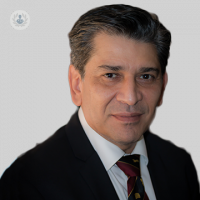Neck lumps: What to know
Written in association with:Coming across a lump in the neck can be worrying. In most cases, however, neck lumps have a non-serious cause and will resolve themselves with the treatment of any accompanying infection or inflammation. Nonetheless, as highly respected consultant oral and maxillofacial surgeon Mr Peyman Alam explains in this informative article, it’s important to see a doctor about any persistent lumps or swellings in the neck.

What are the most common causes of neck lumps?
The most common cause of a lump in the neck is an enlarged lymph node. This could be as a result of infection, inflammation or some types of benign or malignant tumours. Another cause of neck lumps could be enlarged salivary glands, such as the mandibular gland, as a result of an enlarged thyroid gland which is found in the midline of the neck. There are also other causes, which are rare such as vascular malformations or cysts.
Is a neck lump cause for concern?
A worrying feature of a neck lump is when it does not disappear and persists for longer than 3 to 4 weeks. Additionally, associated symptoms such as weight loss, change of voice, difficulty swallowing or breathing and night sweats, may be a cause for concern. It’s important to see your doctor about any symptoms or changes you notice.
How are neck lumps assessed?
The first step would be a clinical examination by palpating (feeling) the neck, as well as the mouth. Next, we would perform a scan, such as an ultrasound, CT or MRI scan. As part of the ultrasound scan, we can also carry out a biopsy known as FNA biopsy, or fine needle aspiration cytology.
Which type of specialist should I see about a neck lump?
Any specialist with expertise and skill in head and neck surgery can advise on a neck lump. In the UK, this is usually an oral and maxillofacial surgeon with head and neck or ear, nose and throat (ENT) training.
Do neck lumps go away on their own?
This really depends on the cause of the neck lump. For instance, if it is due to infection, then antibiotics and resolution of the infection will get rid of the lump. If the neck lump is due to a malignant tumour or cancer, the neck lump will not go away on its own and will require urgent treatment.
If you are concerned about a neck lump and wish to schedule a consultation with Mr Alam, you can do so by visiting his Top Doctors profile.



